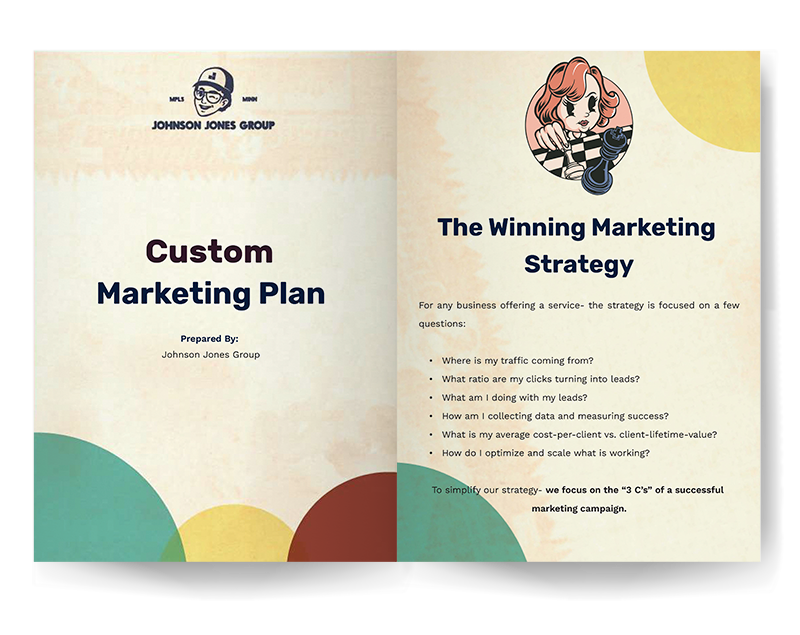Introduction to Google Ads PPC (Pay Per Click)
Google ads is simply a service that promotes websites to people searching for goods/services in a given area. The more people “bid” on search terms, or “keywords,” the more likely it is to capture that search traffic onto a given landing page.
This is why we call it a “pay per click” (PPC) service. The more you pay, the more clicks you’ll get, and the more traffic you’ll get to your website.
After a potential customer searches for your service, there’s a chance they’ll click on your advertisement. You’ll be charged for this “click” and redirected to a landing page.
Each landing page is customized for each niche service within your industry – Here’s an example for a therapist:
- CBT
- Anxiety Therapy
- Online Therapy
- Couples’ Therapy
The cost per click (CPC), depends on the keyword. If someone searches for “Real Estate Lawyer” the CPC could be upwards of $25 per click. “CBT near me” or “couples therapy near me” clicks usually range around $3-$5 per click.
After you’ve generated a Google Ads campaign for your business, you can decide the maximum amount you’d like to spend per click, and per day!
The more you spend on your campaigns, the more traffic you’re going to see!
If you have questions about your landing pages, please reach out to us!
Locations & Budgets
After your campaigns are created, you’ll need to consider two critical questions:
- Where do you want to advertise?
- How much do you want to spend per day?
Each campaign has both location settings and daily budget settings. Location settings help define where you want your ads to show up geographically, and daily budgets are exactly how much you want to spend each day on a particular ad campaign.
Depending on your industry, your location preference may differ. Can you operate online? Do you need to be physically on location for your services? Are you permitted to operate anywhere in the USA?
It can still be a plus to pick a local region and focus on that local traffic – this can partner with an SEO strategy nicely.
The budget breakdown is simply your total daily spend on keywords for a given campaign.
If your budget is at $15/day – you can have up to five $3 clicks, or three $5 clicks, etc… which will hopefully end up being a few leads!
Keyword Planner
Keyword planner is going to be your best friend. In your Google Ads account find “tools & settings” in the top right corner.
Tools & Settings > Planning > Keyword Planner
Here you can see rough data estimates for any of the keywords you’d like to be focusing on. It shares a rough estimate of your keyword data as shown below:
Here you can see an estimated volume (number of searches), keyword suggestions, and the average cost per click of each suggested keyword. This is a great place to find new ideas for your keywords, and check the viability of others.
When you find a few keywords you like, add them to an existing campaign, not a plan. There you can choose which Ad Group to feature the keyword in:

Find Out How We Can Help Grow Your Business
Let’s discuss your marketing needs, and we’ll help you put together a digital marketing strategy that will generate more leads and save you time.
Keyword Modifiers
Keyword modifiers help control how your ads are shown. The three modifiers are:
Broad Match: +blue +nikes
Phrase Match: “blue nikes”
Exact Match: [blue nikes]
Broad Match
If your ads & keywords are labeled with a broad match modifier, it means they will be shown to anyone searching for the words “blue” & “nike” as well as other related searches. It is the most inclusive modifier and casts the biggest net. Some good examples of broad match modifiers helping are:
Red nike cleats
Blue adidas near me
Red and blue nikes
These results are in line for what we’d like to see as qualified searches. However, some instances of broad match modifying can lead to inaccurate and misleading searches like:
Sky blue logo nikes
Nikes blue uniform Oregon
Dark red Nikes sweatshirt
Notice how none of these are related to shoes. These are all examples of non-qualified searches. We aren’t showing our ads to the right search. We want people looking for shoes in this example.
Phrase Match
This is a more targeted modifier. Phrase match simply ensures the keywords with the quotation marks are within the search, as well anything else extra:
Best blue nikes
Blue nikes near me
Reviews about blue nikes
This is an excellent tool to help qualify your searches a little more. It is the sweet spot between broad match & exact match. It allows for extra adjectives you haven’t thought of, but also help keep your keywords efficient and qualified.
Exact Match
This modifier ensures the keywords must be exactly as you’ve written them:
Blue nikes
There are no extra words, no extra adjectives, only exactly what is in between the brackets. This is a great tool to know exactly who is clicking on your ads and why. The volume of clicks may suffer when you choose this modifier, but you tend to know exactly what people are looking for.
This is a great tool to use if you are manually setting the cost of each keyword and its modifier. You can set a max bid much higher on an exact match keyword, since there’s a better chance of a conversion!
[blue nikes for sale]
This keyword is modified by exact match and will only trigger an advertisement when searched exactly that way.
You can also combine keyword modifiers and bid differently on them. Bid the lowest on broad, second on phrase, and the most on exact.
Keyword Bidding
Each keyword is a mini item up for auction. There’s a chance that anyone could be bidding for any given keyword.
Google awards its traffic to the highest bidder on each keyword.
You can manually decide how much you’d like to spend on each keyword, per click, or alternatively, you can choose one of Google’s bidding strategies. This for example is set to “Maximize Clicks” – with a max cost-per-click (CPC) of $5.00.
Writing & Revising Google Ads
As long as your focus keywords are included within the ads, and you have the Call To Action to match, you’re sure to see some success. Here’s an example from an assisted living home in Philadelphia.
As you run your Google Ads account, you’ll want to pay close attention to the two (almost) identical advertisements for every ad group – each has one small difference between the two.
Every month, you should put time aside to evaluate which ad variance is performing better. We call this A-B testing. There you can match the two ads to the best performing variance, and create another AB test with a new variance.
For a few more ideas on writing your Google ads, check out this awesome resource from Word Stream.
It’s absolutely essential to ensure you’re making your money back from your Google Ads account. Here’s the first step to that.
Math Time
How much does one customer make you in total?
Do the research yourself by asking yourself
- How much on average do I earn from a job/customer?
- How many total jobs does each customer hire me for?
- How many times am I being hired?
Multiply these values together and you’ll get your lifetime value of a customer.
Depending on the service (as there are many, with vast differences in budgets and costs), the value is going to be very different.
Cost Per Acquisition (CPA)
This is often listed as cost per conversion as well. Here you’ll have your Google Analytics linked up to track how many people have successfully completed your CTA (or your analytics goal).
This is arguably one of the most important parts of understanding your Google ads budgets. If you spend $5000 to get one customer, the math just doesn’t add up!
Now if your CPA is $100/customer – we’ll start to see some improvements on your bottom line.
Figure out how much you’re spending on your Google Ads accounts in 30 days total, then divide that value by the number of jobs you booked during those 30 days.
If your total Google ads spend last month was $1000, and you booked 10 new customers, you’d have a CPA of $100
- Total Costs & Return On Investment (ROI)
ROI = Lifetime Value ➗ CPA
In this example, our Lifetime Value is $5,000 and our CPA is $100.
You’d have a 50X ROI on this marketing campaign.
Summary
Make sure you’re constantly reevaluating your ads. Frequently check how much you’re spending on each click. See what people are searching for in the “search terms” keyword tab. If you’re getting expensive clicks from keywords that are unsuccessful at converting – you’ll need to change how people find your ads.
If your cost per conversion is too high, maybe revisit how much each click is and why you’re not getting enough interest. The more conversions you get, the lower your CPA becomes.
Finally, AB testing on a weekly basis will help keep your ads fresh and optimized. Specifically try to focus on Click Through Rate (CTR) – a normal CTR is around 5%. 10% is amazing, 2% is pretty bad.
Use this data to help keep you informed on what’s working and what needs to change. Here’s some date from an example of a successful Google Ads campaign:
The key focus points are:
- Click Through Rate (CTR) [Average 5%]
- Cost Per Click (CPC) [Keep lower than $4.00 for most industries]
- Cost Per Acquisition/Conversion (CPA) [The lower the better]
- Conversion Rate [Aim for 10%, but 5% is ok]
- Clicks [Varies]
- Impressions (How many people are seeing your ad)[varies]
If these data points remain within an average standard deviation, you should start to see a good return on your investment with Google Ads!


